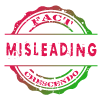
Social media users are claiming that popular chocolate brands like Ghirardelli, KitKat, Ferrero Rocher, and Reese’s contain harmful ingredients. These ingredients are claimed to be toxic and carcinogenic in nature which leads to various serious diseases.
However, Fact Crescendo found the claim to be false. All the ingredients mentioned in the post are approved by food safety regulatory bodies and are considered safe.
Sharing the video, a social media user wrote, “Think twice before grabbing that chocolate! Shocking ingredients in your favorite treats could be harming your health. Ghirardelli’s soy lecithin may mess with your metabolism. Ferrero Rocher’s whey & wheat might disrupt hormones and gut health. Kit Kat’s PGPR is linked to toxicity and cancer risks. Hershey’s GMO soy could inflame your body, and Reese’s TBHQ may damage DNA and weaken immunity”
Fact Check-
Let’s check the facts about each ingredients mentioned.
Ghirardelli contains soy lecithin: Lecithin is a naturally occurring mixture of the phosphatides of choline, ethanolamine, and inositol, with smaller amounts of other lipids. It is Generally Recognized as Safe (GRAS) under FDA regulation. According to this regulation, lecithin can be used in food with no limitations other than adhering to the current good manufacturing practices.
The EFSA re-evaluated lechitins (E 322) and concluded that it is safe for consumption. Further, it stated that Acceptable Daily Intake (ADI) value is not required for lechitins as exposure levels from food consumption do not pose a safety concern for the general population, including infants and young children.
Ferrero Roacher contains whey and wheat which are carcinogenic: The EFSA had concluded that wheat and whey can be used as food ingredients. But, these are also listed as possible food allergens and the products using these two ingredients must declare it.
FDA as well allowed the use of wheat and wheat-derived ingredients in foods, including products that are not labeled as gluten-free. However, In case of gluten free products, special labelling is required clarifying that the wheat has been processed to meet FDA’s gluten-free standards.This means wheat is not prohibited in foods.
KitKat contains PGPR, a known carcinogen: Polyglycerol Polyricinoleate (PGPR) is approved as a food additive in the European Union with specific purity standards set by Commission Regulation. It was first evaluated by the FAO/WHO’s JECFA in 1969 and 1974, which established a safe daily intake of 0 – 7.5 mg per kilogram of body weight.
PGPR was also evaluated by the Nordic Council of Ministers. It was concluded that ‘the toxicological data available to JECFA in 1973 or to SCF in 1977 did not include all the data. However, more recent studies support the safety of PGPR at these levels.
Reese’s contains TBHQ which suppresses the immune system: The EFSA Panel reviewed the safety of TBHQ (E 319), a food additive allowed in the EU with a safe daily intake limit of 0.7 mg per kilogram of body weight. While past assessments found that adult exposure stayed within this limit, there was concern that infants consuming infant formula with TBHQ might exceed the limit. To refine the assessment, EFSA analyzed new data on how much TBHQ is used in foods and how much people actually consume. The results showed that, at maximum allowed levels, toddlers and children could exceed the safe limit. However, in more realistic scenarios, the safe limit was not exceeded for any group.
FDA approved TBHQ as a food additive and set specific conditions for its safe use. As per FDA, TBHQ must have a melting point of at least 126.5°C and be at least 99% pure. It should be used as an antioxidant, either alone or with BHA and BHT, to prevent oxidation in foods and the total amount of antioxidants, including TBHQ, in a food must not exceed 0.02% of the fat or oil content in the food.
Conclusion:
Fact Crescendo found the claim to be false. All the ingredients mentioned in the post are approved by food safety regulatory bodies and are considered safe.

Title:Ghirardelli, Ferrero Roacher, KitKat and Reese’s are unsafe for consumption? Know the facts.
Fact Check By: Siddharth SahuResult: Misleading


